Related Research Articles

Nakhon Ratchasima is one of Thailand's seventy-six provinces (changwat) lies in lower northeastern Thailand also called Isan. At 20,494 sq km it is the country's largest province by area, has a population of approximately 2.7 million, and generates about 250 billion baht in GDP, the highest in Isan. Neighbouring provinces are Chaiyaphum, Khon Kaen, Buriram, Sa Kaeo, Prachinburi, Nakhon Nayok, Saraburi, and Lopburi.
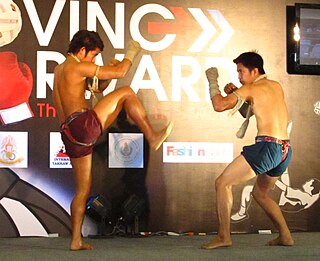
Muay Boran or originally Toi Muay is an umbrella term for the ancient unarmed martial arts of Thailand prior to the introduction of modern equipment and rules in the 1930s.
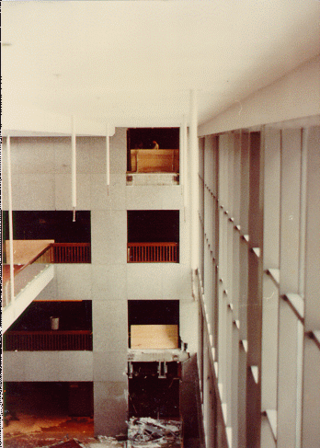
On July 17, 1981, two overhead walkways in the Hyatt Regency Hotel in Kansas City, Missouri collapsed, killing 114 people and injuring 216. Loaded with partygoers, the concrete and glass platforms crashed onto a tea dance in the lobby. The collapse resulted in billions of dollars of insurance claims, legal investigations, and city government reforms.

The collapse of Hotel New World was a civil disaster that occurred in Singapore on 15 March 1986. The Hotel New World was a six-story building situated at the junction of Serangoon Road and Owen Road in the Rochor district when it suddenly collapsed, trapping 50 people beneath the rubble. 33 people died and 17 people were rescued.
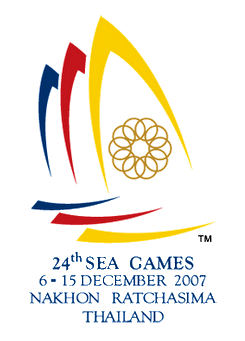
The 2007 Southeast Asian Games, officially known as the 24th Southeast Asian Games, was a Southeast Asian multi-sport event held in Nakhon Ratchasima (Korat), Thailand. This was the sixth time Thailand hosted the Southeast Asian Games and its first time since 1995. Previously, Thailand also hosted the 1959 inaugural games, 1967 games, 1975 games and the 1985 games.

The Highland Towers collapse occurred on 11 December 1993 in Taman Hillview, Ulu Klang, Selangor, Malaysia. Tower Block 1 collapsed from a major landslide caused by heavy rains that burst diversion pipes. The Highland Towers consisted of three 12-storey buildings or "blocks". The collapse of Block 1 resulted in 48 deaths. Residents of the other two blocks and neighbouring establishments were evacuated due to safety concerns.
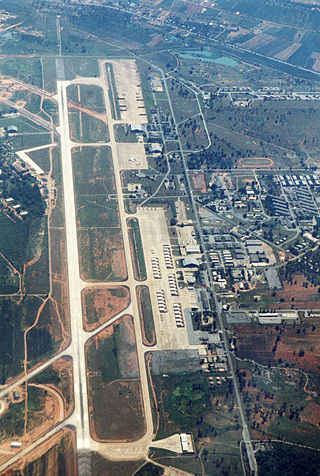
Korat Royal Thai Air Force Base is a base of the Royal Thai Air Force (RTAF) in northeast Thailand, approximately 200 km (125 mi) northeast of Bangkok and about 4 km (2.5 mi) south of the centre of the city of Nakhon Ratchasima in the Nakhon Ratchasima Province, the largest province in Thailand.
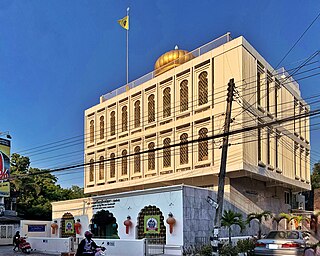
Sikhism is a recognised minority religion in Thailand, with about 70,000 adherents. The religion was brought by migrants from India who began to arrive in the late 19th century. There are about twenty Sikh temples or Gurdwaras in the country, including the Gurdwara Sri Guru Singh Sabha in Bangkok.

Progressive collapse is the process where a primary structural element fails, resulting in the failure of adjoining structural elements, which in turn causes further structural failure.
Klang Plaza is a local shopping mall in Nakhon Ratchasima, Thailand. It has three outlets and is building a fourth near the railway station. It was founded by local businessman, Mr Paisarn Manasilp. The business started in 1958 with a book and stationery store, Klang Wittaya, which is still in operation. The company operates under the motto "The Korat Department Store." It concentrates on supermarket and stationery supplies and ensuring that its stores are within walking distance of city neighourhoods.

Terminal 21 is a chain of mixed-use complexes with 4 locations in Thailand; Asok and Rama III in Bangkok, Korat, and Pattaya. The first location was opened in October 2011, located on Sukhumvit Road, by the Asoke intersection, in Watthana District of Bangkok, Thailand. The second location, Terminal 21 Korat, was opened in December 2016 and is located on Mittraphap Road in Nakhon Ratchasima Province. Terminal 21 Pattaya was opened in October 2018 and is located in Pattaya District of Chonburi Province. There is a proposal for Terminal 21 Rama III to be built by the Chao Phraya river in the Rama III neighbourhood of Yannawa District in Bangkok. On October 20, 2022, Terminal 21 Rama III officially opened.

On June 29, 1995, the Sampoong Department Store in Seoul, South Korea, collapsed due to a structural failure. The collapse killed 502 people and injured 937, making it the largest peacetime disaster in South Korean history. It was the deadliest non-deliberate modern building collapse until the 2013 Rana Plaza factory collapse in Bangladesh.
Royal Plaza, Royal Square, or similar may refer to:
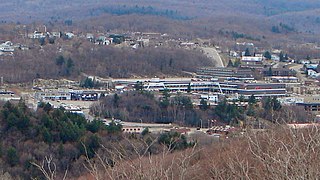
The Algo Centre Mall was a mall and hotel located near Highway 108 in Elliot Lake, Ontario, Canada. It was the largest commercial complex in the area. When the community was hit by uranium mine closures in the 1990s, the complex gradually refocused, hosting multiple services, such as a library, constituency offices, and public health offices. In the years leading up to 2012, many businesses located in the mall either closed or moved to outside locations. Still, the mall was a community hub, with most of the area's clothing stores and its largest grocery store, employing upwards of 250 local residents. It accounted for 10% of the community's retail space and 6% of the total wages.

The Rana Plaza collapse occurred on 24 April 2013, when the eight-storey Rana Plaza commercial building collapsed due to a structural failure. The search for survivors lasted for 19 days and ended on 13 May 2013, with a confirmed death toll of 1,134. Approximately 2,500 injured people were rescued from the building. It is considered to be one of the deadliest structural failures in modern human history, as well as the deadliest garment-factory disaster in history, and is the deadliest industrial accident in the history of Bangladesh. Amnesty International called it "the most shocking recent example of business-related human rights abuse."

Nakhon Ratchasima is the capital of Nakhon Ratchasima province, the largest city in Northeastern Thailand and the third-largest city in Thailand. It is 250 km northeast of Bangkok, one of the four major cities of Isan, known as the "big four of Isan", and has a population of 466,098 people as of 2021. The city is commonly known as Korat, a shortened form of its name.

The 43rd Thailand National Games were held in Nakhon Ratchasima, Thailand from 9 to 19 December 2014. Competition included 43 sports and 77 disciplines. These games held in the 80th Birthday Sport Center, Suranaree University of Technology Sport Center. Nakhon Ratchasima also hosted the 2007 Southeast Asian Games.

Between 8 and 9 February 2020, a mass shooting occurred near and in Nakhon Ratchasima, Thailand, colloquially known as Korat. A soldier of the Royal Thai Army killed 29 people and wounded 58 others before he was eventually shot and killed.
Xinjia Express Hotel was a hotel in Licheng District, Quanzhou, Fujian, China. On 7 March 2020, while being used to quarantine COVID-19 patients, it collapsed from overloading resulting from illegal construction, killing 29 people and injuring another 42.
References
- 1 2 3 4 5 6 7 8 9 Kanok-Nukulchai, Worsak, ed. (30 September 1994). Investigation Report on Collapse of Royal Plaza Hotel: Executive Summary (Technical report). Engineering Institute of Thailand. pp. XVII–XXII. Available at thaiengineering.com Archived 2015-02-15 at the Wayback Machine .
- ↑ Shenon, Philip (15 August 1993). "Death Toll Rises to 88 in Thailand Hotel Collapse". The New York Times. Retrieved 3 October 2012.
- ↑ "Rescuers Keep Searching". Orlando Sentinel. 16 August 1993. Retrieved 4 October 2012.
- ↑ "17 ปี ย้อนรอยโศกนาฏกรรม ร.ร.รอยัลพลาซ่า โคราช". Thai Rath Online (in Thai). 14 August 2010. Retrieved 20 November 2013.
- 1 2 3 "Court orders five to pay Bt152 million compensation for Korat Hotel collapse". The Nation. 7 March 2009. Archived from the original on 30 March 2013. Retrieved 13 October 2013.